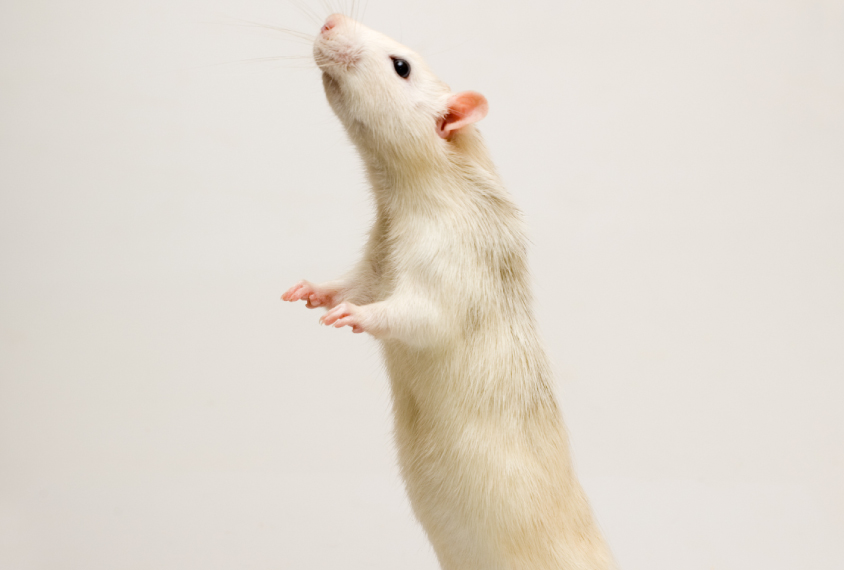IMFAR 2014
Recent articles
Rats with mutant SHANK genes show autism-like behaviors
Researchers have engineered two new rats with mutations in a family of genes that function at neuronal junctions, they reported today at the 2014 International Meeting for Autism Research in Atlanta.

Rats with mutant SHANK genes show autism-like behaviors
Researchers have engineered two new rats with mutations in a family of genes that function at neuronal junctions, they reported today at the 2014 International Meeting for Autism Research in Atlanta.
Takeaways from IMFAR 2014
A focus on adults with autism and on junior researchers in the field were two of the themes at the 2014 International Meeting for Autism Research in Atlanta, Georgia.

Takeaways from IMFAR 2014
A focus on adults with autism and on junior researchers in the field were two of the themes at the 2014 International Meeting for Autism Research in Atlanta, Georgia.
Distinct differences mark male, female autism brains
Male and female preschoolers with autism have distinct sets of brain regions that distinguish them from typically developing controls, according to unpublished research presented Saturday at the 2014 International Meeting for Autism Research in Atlanta.

Distinct differences mark male, female autism brains
Male and female preschoolers with autism have distinct sets of brain regions that distinguish them from typically developing controls, according to unpublished research presented Saturday at the 2014 International Meeting for Autism Research in Atlanta.
Autism gene may be key to discovering new candidates
CHD8, a gene that has emerged as one of the strongest risk factors for autism, regulates the expression of more than half of a set of 'high-confidence' risk genes for the disorder. The unpublished data were presented Saturday at the 2014 International Meeting for Autism Research in Atlanta.

Autism gene may be key to discovering new candidates
CHD8, a gene that has emerged as one of the strongest risk factors for autism, regulates the expression of more than half of a set of 'high-confidence' risk genes for the disorder. The unpublished data were presented Saturday at the 2014 International Meeting for Autism Research in Atlanta.
Autism development may be obscured by parents’ memory
Parents may notice a loss of skills in their children as it is happening, but do not recall it clearly later on. The unpublished research, presented yesterday at the 2014 International Meeting for Autism Research in Atlanta, hints at a fatal flaw in diagnostic tools for autism that rely on parents’ memory.

Autism development may be obscured by parents’ memory
Parents may notice a loss of skills in their children as it is happening, but do not recall it clearly later on. The unpublished research, presented yesterday at the 2014 International Meeting for Autism Research in Atlanta, hints at a fatal flaw in diagnostic tools for autism that rely on parents’ memory.
Some infants at risk of autism show improvements at 9 months
Some infant siblings of children with autism initially behave like children with the disorder, but show improvements in their social skills around 9 months of age. The unpublished research, presented yesterday at the 2014 International Meeting for Autism Research in Atlanta, suggests that these children possess a “resilience” that keeps them from developing autism.

Some infants at risk of autism show improvements at 9 months
Some infant siblings of children with autism initially behave like children with the disorder, but show improvements in their social skills around 9 months of age. The unpublished research, presented yesterday at the 2014 International Meeting for Autism Research in Atlanta, suggests that these children possess a “resilience” that keeps them from developing autism.
Adults with autism may have high burden of health problems
Adults with autism may suffer from various health problems, ranging from psychiatric conditions to motor symptoms that resemble Parkinson’s disease, according to two studies presented Thursday at the 2014 International Meeting for Autism Research in Atlanta.

Adults with autism may have high burden of health problems
Adults with autism may suffer from various health problems, ranging from psychiatric conditions to motor symptoms that resemble Parkinson’s disease, according to two studies presented Thursday at the 2014 International Meeting for Autism Research in Atlanta.
Autism-linked chromosomal region regulates brain size
The genes in 16p11.2, the autism-linked region on chromosome 16, may directly affect brain size early in development, according to unpublished research presented Thursday at the 2014 International Meeting for Autism Research in Atlanta.

Autism-linked chromosomal region regulates brain size
The genes in 16p11.2, the autism-linked region on chromosome 16, may directly affect brain size early in development, according to unpublished research presented Thursday at the 2014 International Meeting for Autism Research in Atlanta.
Reactions from IMFAR 2014
Daily updates and reactions from attendees at the 2014 International Meeting for Autism Research in Atlanta, Georgia.

Reactions from IMFAR 2014
Daily updates and reactions from attendees at the 2014 International Meeting for Autism Research in Atlanta, Georgia.
Explore more from The Transmitter
Neuro’s ark: Spying on the secret sensory world of ticks
Carola Städele, a self-proclaimed “tick magnet,” studies the arachnids’ sensory neurobiology—in other words, how these tiny parasites zero in on their next meal.

Neuro’s ark: Spying on the secret sensory world of ticks
Carola Städele, a self-proclaimed “tick magnet,” studies the arachnids’ sensory neurobiology—in other words, how these tiny parasites zero in on their next meal.
Autism in old age, and more
Here is a roundup of autism-related news and research spotted around the web for the week of 2 March.

Autism in old age, and more
Here is a roundup of autism-related news and research spotted around the web for the week of 2 March.
Lack of reviewers threatens robustness of neuroscience literature
Simple math suggests that small groups of scientists can significantly bias peer review.

Lack of reviewers threatens robustness of neuroscience literature
Simple math suggests that small groups of scientists can significantly bias peer review.